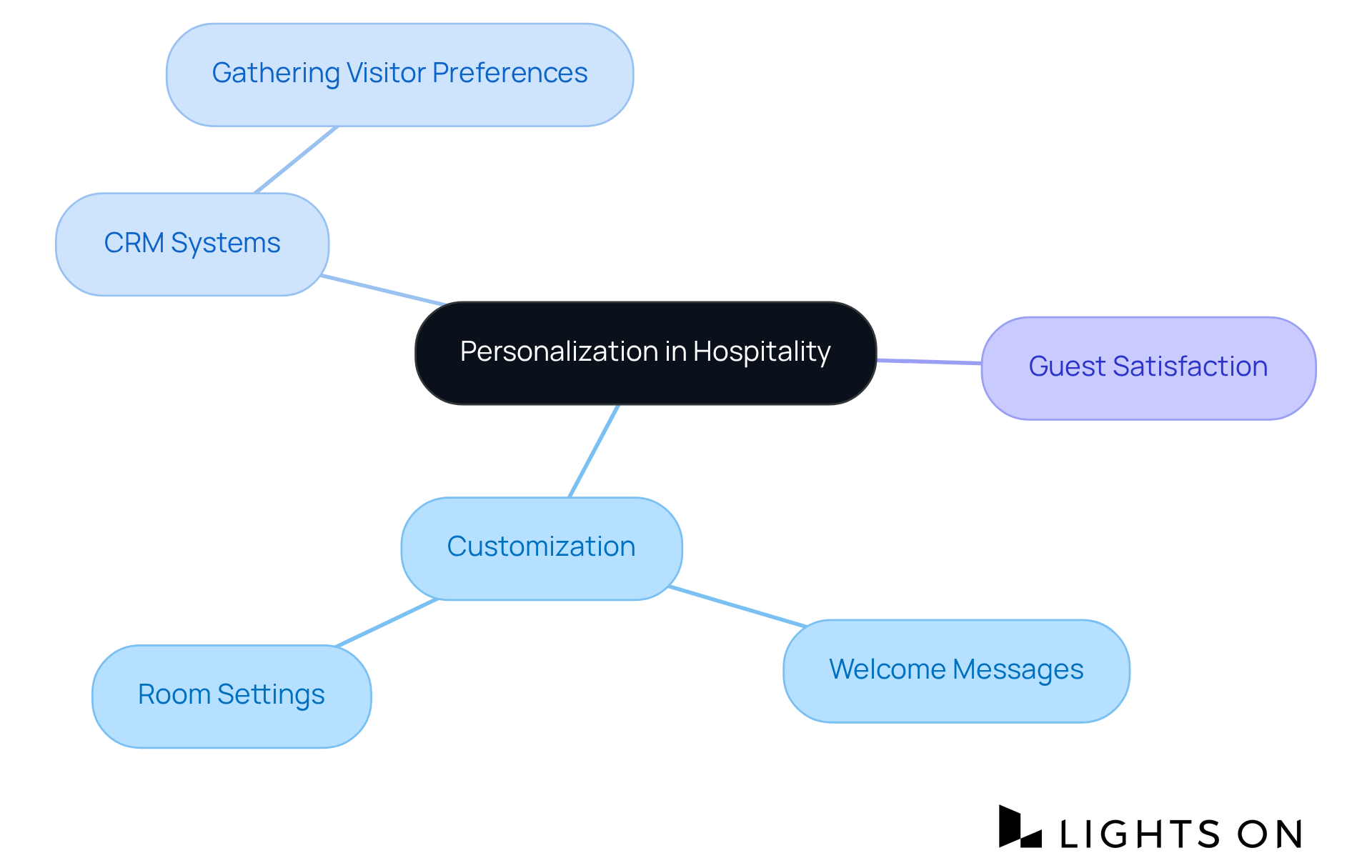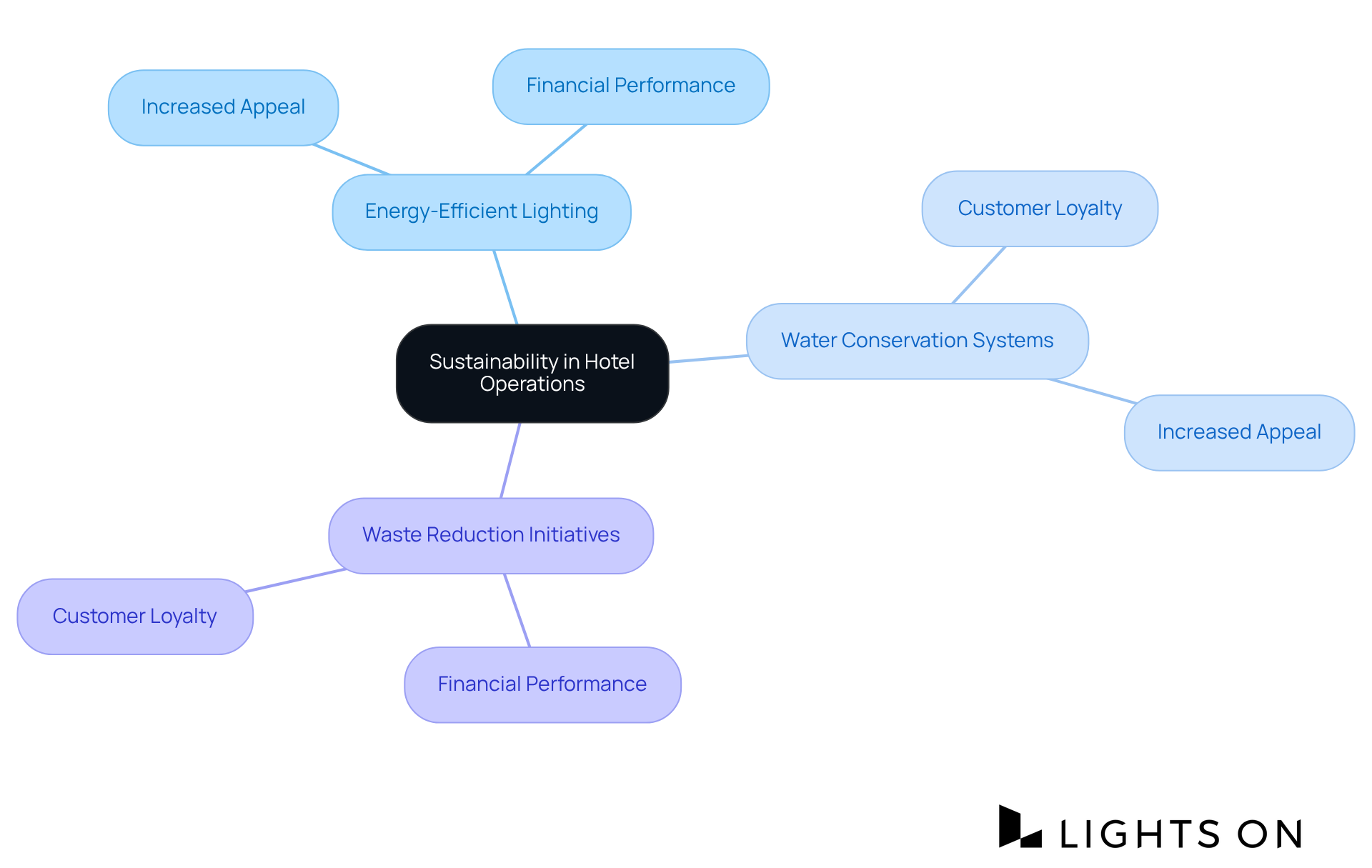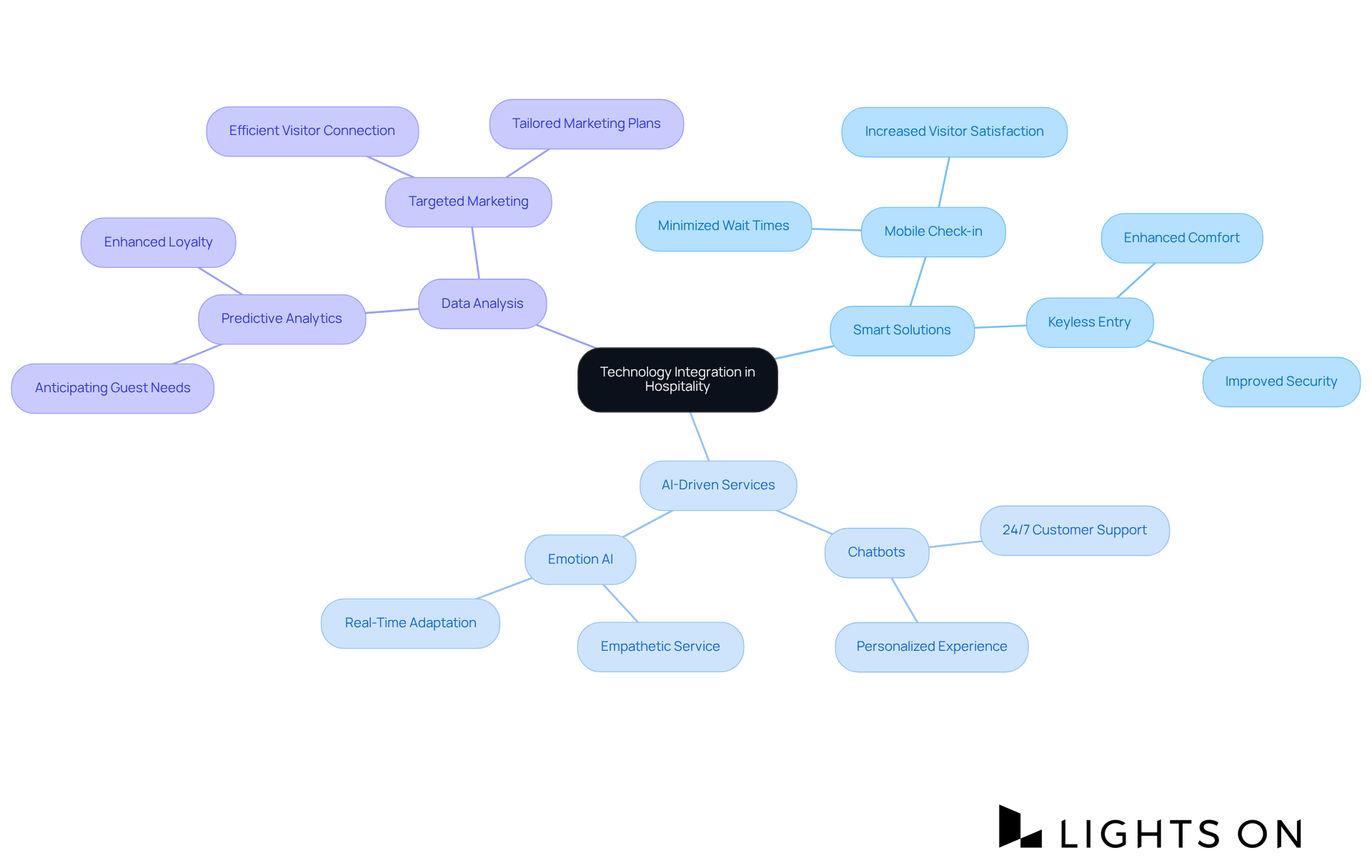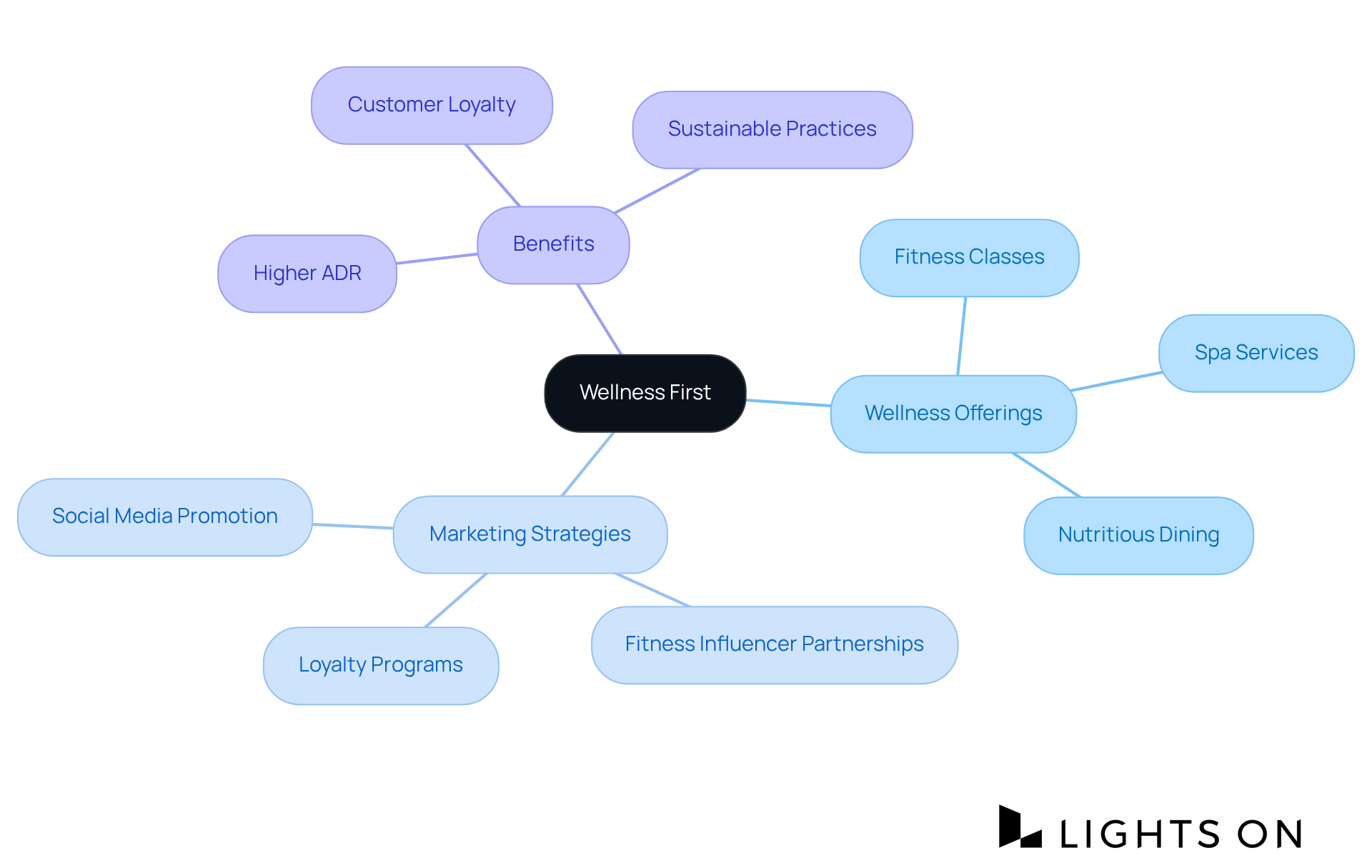This article delineates ten prevailing trends in the hotel industry that possess the potential to significantly enhance business outcomes. Key trends include:
Each trend is substantiated by compelling evidence and real-world examples, demonstrating how accommodations can elevate guest satisfaction, boost occupancy rates, and optimize financial performance through innovative practices and targeted marketing strategies.
The hotel industry is undergoing a significant transformation, driven by shifting traveler expectations and emerging trends that redefine guest experiences.
As accommodations strive to enhance their appeal and profitability, understanding these current trends becomes essential for success.
This article explores ten innovative strategies that not only boost business performance but also cater to the evolving needs of modern travelers.
How can hotels leverage data-driven insights, personalized services, and sustainable practices to stand out in a competitive market?
The answers lie in embracing these trends and adapting to the demands of today’s discerning guests.
Utilizing data-driven insights is crucial for accommodations seeking to enhance their revenue management strategies. By meticulously examining market trends, customer behaviors, and pricing approaches, accommodations can make informed decisions that elevate both occupancy and revenue. To effectively implement these strategies, property owners should consider adopting dynamic pricing models and employing demand forecasting tools. These methods facilitate the identification of optimal pricing strategies, enabling accommodations to remain competitive in a saturated market.
Furthermore, leveraging historical data is essential for making timely pricing adjustments and maximizing profitability. Metrics such as Revenue per Available Room (RevPAR) and Average Daily Rate (ADR) serve as vital indicators of financial performance, guiding strategic decisions. Lights On excels in delivering these insights, empowering clients to implement actionable changes that significantly enhance their financial performance.

Customization in hospitality is essential for adapting services and offerings to meet the unique preferences of every visitor. This can encompass everything from personalized welcome messages to tailored room settings based on previous stays. Furthermore, implementing customer relationship management (CRM) systems enables establishments to gather valuable information on visitor preferences. This data allows for the design of customized experiences that significantly enhance satisfaction and foster loyalty.
By concentrating on personalization, accommodations can cultivate stronger relationships with their guests. In addition, this approach ultimately encourages repeat visits and positive evaluations. Are you ready to elevate your guest experience and drive loyalty through tailored services? Embrace the power of customization to transform your hospitality offerings.

Sustainability in the lodging sector is an imperative, not an option. Eco-friendly practices such as:
significantly enhance an establishment's appeal to environmentally conscious travelers. Furthermore, accommodations can effectively promote these initiatives through social media campaigns that showcase their sustainability efforts. By creating partnerships with eco-friendly brands and offering incentives for visitors who participate in green programs, hotels can attract a broader audience. In addition, marketing these initiatives positions hotels as leaders in a growing market segment, ultimately boosting bookings and enhancing revenue management.
Prioritizing sustainability not only benefits the environment but also serves as a strategic advantage in the competitive hospitality landscape. By showcasing their commitment to eco-friendly practices, hotels can engage with a demographic that values sustainability. This engagement can lead to increased customer loyalty and repeat business, as travelers increasingly seek out accommodations that align with their values.
In conclusion, the integration of sustainable practices is essential for modern lodging establishments. By adopting and promoting these initiatives, hotels can not only contribute positively to the planet but also enhance their market positioning and financial performance. The time to act is now—embrace sustainability and reap the rewards.

As remote work continues to reshape the hospitality industry, accommodations find themselves in a prime position to attract long-stay guests who prioritize both comfort and productivity. Essential amenities—such as high-speed internet, dedicated workspaces, and flexible check-in/check-out options—are crucial for appealing to this demographic.
Furthermore, implementing successful long-stay packages that offer discounts for extended bookings can significantly enhance occupancy rates. By aligning their services with the specific needs of remote workers, accommodations can effectively capitalize on this expanding market segment, ensuring a competitive edge as we approach 2025.

Incorporating technology into lodging operations is essential for maintaining a competitive edge by adapting to current trends in the hotel industry. Smart solutions, such as mobile check-in, keyless entry, and AI-driven customer service, not only streamline operations but also significantly enhance visitor experiences. For instance, hotels that implement mobile check-in have reported increased visitor satisfaction, as this feature facilitates a smooth arrival process, minimizing wait times and enhancing overall convenience. Additionally, keyless entry systems allow visitors to unlock their rooms using mobile devices, further improving their comfort and security.
The implementation of AI-driven customer service, including chatbots, has proven effective in managing visitor inquiries and reservations around the clock. This technology provides instant responses and reduces staff workload, fostering a more personalized experience by analyzing visitor behavior and preferences to tailor services accordingly. Furthermore, data analysis plays a crucial role in understanding visitor preferences, enabling accommodations to enhance their services and improve operational effectiveness. For example, accommodations that adopt predictive analytics can anticipate visitor needs, resulting in heightened loyalty and satisfaction.
To further optimize reservations, accommodations can execute targeted marketing strategies that leverage data insights to connect with prospective visitors efficiently. By employing technology to analyze current trends in the hotel industry and visitor preferences, accommodations can develop tailored marketing plans that resonate with their audience.
By leveraging these technologies and integrating effective marketing strategies, accommodations not only boost their operational efficiency but also create a more enjoyable and memorable experience for visitors. This positions them for success in 2025 and beyond.

In the evolving landscape of hospitality, creating health-conscious environments is paramount. Hotels are increasingly adopting wellness programs that encompass a variety of offerings, such as fitness classes, nutritious dining options, and rejuvenating spa services. These initiatives not only cater to the growing demand for health and wellness among travelers but also significantly enhance guest satisfaction. For instance, accommodations that implement comprehensive wellness programs report a 15% higher Average Daily Rate (ADR) compared to those that do not.
To effectively attract health-conscious travelers, accommodations should leverage targeted marketing campaigns that highlight their wellness offerings. This method not only attracts visitors who emphasize fitness and well-being but also aids in positioning a property's brand as a leader in health-conscious hospitality. Specific strategies could involve:
With 72% of travelers expressing a preference for eco-friendly practices, integrating sustainable wellness initiatives can further enhance an establishment's appeal, aligning with the values of modern consumers.
By prioritizing wellness and establishing welcoming health-oriented settings, hotels can set themselves apart in a competitive market, ultimately resulting in heightened customer loyalty and repeat reservations. As the hospitality sector embraces current trends in the hotel industry, focusing on fitness and wellness as vital aspects of the visitor experience, those who adopt these trends will likely observe enhanced financial performance and a more robust competitive advantage.

Health and safety innovations are paramount for instilling visitor confidence in today’s travel environment. Hotels must adopt rigorous cleaning protocols, contactless services, and transparent communication regarding health measures.
To effectively promote these initiatives, accommodations can leverage social media campaigns to:
By reassuring prospective visitors through these strategic marketing efforts, accommodations can drive reservations. Demonstrating a commitment to visitor safety not only fosters trust but also enhances the overall visitor experience.

To meet the varied requirements of today's travelers, accommodations are increasingly reimagining their spaces by incorporating current trends in the hotel industry. This transformation involves the incorporation of co-working spaces, communal lounges, and adaptable room layouts that reflect current trends in the hotel industry and cater to diverse visitor preferences. By establishing these adaptable settings, accommodations can significantly enhance visitor satisfaction and attract a broader audience. For instance, the integration of ground-floor swim-up rooms has been shown to boost room rates by over 30%, clearly demonstrating the financial benefits of innovative design.
Furthermore, the movement towards outdoor activities allows accommodations to reduce indoor air-conditioned areas, resulting in cost savings while enhancing visitor interaction with nature. This shift not only meets the desires of an upwardly mobile visitor segment seeking unique opportunities but also promotes wellness through immersive natural settings.
To capitalize on these trends, property owners should consider implementing targeted marketing strategies that highlight their unique offerings. For example, promoting outdoor spaces and co-working areas through social media campaigns can attract both leisure and business travelers. Moreover, providing packages that feature wellness activities or distinctive room arrangements can further entice prospective visitors.
The emergence of co-working areas within accommodations enhances the visitor experience, offering essential amenities for business travelers while fostering a sense of community among patrons. Flexible room configurations, such as larger balconies and outdoor bathrooms, balance privacy with social interaction, catering to the evolving expectations of modern travelers.
Ultimately, these innovative concepts not only distinguish properties in a competitive market but also reflect current trends in the hotel industry by generating additional revenue through improved visitor satisfaction and loyalty. By incorporating effective marketing strategies, accommodations can ensure that their evolving concepts resonate with their target audience, ultimately boosting bookings and revenue.

Developing multi-purpose areas within accommodations is essential for fostering community involvement and enhancing visitor interaction. These versatile spaces can serve as venues for events, social gatherings, or co-working areas, effectively promoting connections among individuals. Furthermore, to effectively promote these areas, accommodations should implement targeted marketing strategies. This includes:
By establishing a lively environment that attracts visitors seeking more than just a place to rest, accommodations can significantly improve customer satisfaction and loyalty. Ultimately, this strategy leads to increased reservations and a more vibrant guest experience. In addition, by focusing on these communal spaces, accommodations position themselves as community hubs, appealing to a broader audience and enhancing their market presence.

In today's competitive hospitality environment, creating distinctive offerings that align with the current trends in the hotel industry is essential for attracting guests. Themed accommodations, regional cultural activities, and unique events not only generate unforgettable moments but also serve as effective marketing instruments that differentiate establishments from their rivals. As tourists increasingly seek tailored and engaging experiences, accommodations that effectively promote these distinctive options can draw a diverse customer base.
Positive visitor interactions are crucial, resulting in favorable reviews and repeat patronage, which underscores the significance of this strategy for long-term success. By embracing current trends in the hotel industry, particularly themed accommodations, establishments can capitalize on the growing desire for authenticity and connection, ultimately enhancing their appeal and boosting reservations.
To further engage visitors, hotels should consider partnering with local enterprises to offer exclusive insights and activities, such as guided tours or culinary classes, enhancing their stay and fostering deeper connections with the local culture. According to the Visitor Satisfaction Benchmark Report 2024, customer satisfaction has been on the rise since the beginning of Q3 2022, highlighting the importance of positive interactions. As Jonas Belocura observes, 'Improving visitor experience is essential because it directly affects customer satisfaction.'
Furthermore, the rise of slow travel indicates that guests are increasingly looking for deeper connections with local culture, making themed stays even more relevant.

Embracing the latest trends in the hotel industry is not just beneficial; it is essential for accommodations aiming to thrive in a competitive market. By focusing on:
hotels can significantly enhance their appeal and profitability. Each trend serves as a vital component in crafting an engaging and memorable stay for visitors, ultimately driving loyalty and repeat business.
Key insights highlight the importance of:
Furthermore, creating versatile spaces and unique experiences not only satisfies diverse guest needs but also positions hotels as leaders in innovative hospitality.
In conclusion, the path to success in the hotel industry lies in the ability to adapt and innovate. By integrating these current trends and focusing on the evolving expectations of guests, accommodations can not only boost their business but also contribute positively to the broader hospitality landscape. It is time for hotels to embrace these strategies and redefine their offerings, ensuring they remain relevant and appealing to today’s discerning travelers.
Why is utilizing data-driven insights important for accommodations?
Utilizing data-driven insights is crucial for enhancing revenue management strategies by allowing accommodations to examine market trends, customer behaviors, and pricing approaches, leading to informed decisions that elevate both occupancy and revenue.
What strategies can property owners implement to improve revenue management?
Property owners can adopt dynamic pricing models and employ demand forecasting tools to identify optimal pricing strategies, helping them remain competitive in a saturated market.
How does historical data contribute to revenue management?
Historical data is essential for making timely pricing adjustments and maximizing profitability, with metrics like Revenue per Available Room (RevPAR) and Average Daily Rate (ADR) serving as vital indicators of financial performance.
What role does personalization play in guest experiences?
Personalization is essential for adapting services and offerings to meet the unique preferences of each visitor, enhancing satisfaction and fostering loyalty through tailored experiences.
How can accommodations gather information on guest preferences?
Establishments can implement customer relationship management (CRM) systems to gather valuable information on visitor preferences, allowing for the design of customized experiences.
What are some eco-friendly practices that hotels can implement?
Eco-friendly practices include energy-efficient lighting, water conservation systems, and waste reduction initiatives, which enhance a hotel's appeal to environmentally conscious travelers.
How can hotels promote their sustainability initiatives?
Hotels can promote their sustainability initiatives through social media campaigns, partnerships with eco-friendly brands, and offering incentives for visitors who participate in green programs.
Why is sustainability considered a strategic advantage in hospitality?
Prioritizing sustainability attracts a broader audience, engages environmentally conscious travelers, and positions hotels as leaders in a growing market segment, ultimately boosting bookings and enhancing revenue management.
What benefits do hotels gain from adopting sustainable practices?
By adopting and promoting sustainable practices, hotels can positively impact the environment, enhance their market positioning, increase customer loyalty, and encourage repeat business.
Transform your group booking strategies with Lights On and watch your occupancy soar.